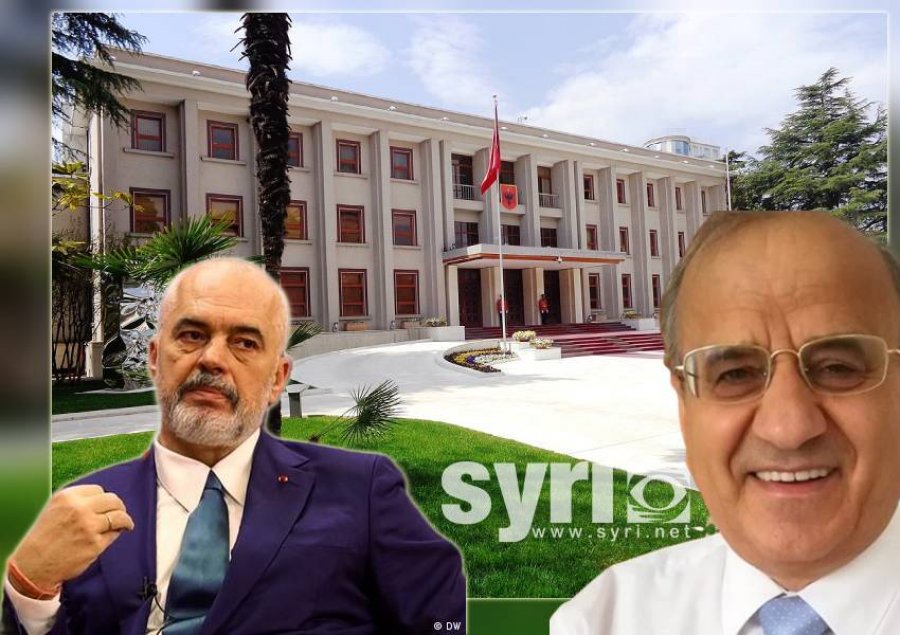
 By Jorgji Kote - 17:33, 14/04/2022
By Jorgji Kote - 17:33, 14/04/2022
The consultations and negotiations for the election of the new Head of State ending on May 24 are an important political and institutional process; considering the unpleasant experiences in the last 25 years. Therefore, in addition to the demarches for finding the right personality, which should not be turned into a political and media "deal/bazaar", it is necessary to reflect deeply on these negative phenomena; but not "black and white", according to the political humor of the day, but objectively, giving "Caesar what belongs to him" and according to the principle "you may not like someone but give him the credit he deserves." In this sense, the exclusive claims that «we need one like this, but not like him». In fact, we need a Head of State, the embodiment of the best qualities of his predecessors, avoiding any unpleasant institutional elements.
On this occasion, it is worth noting that Ilir Meta is neither the first nor the only President to be severely attacked, in Albania and elsewhere. And why, ironically, unlike his successors, as Prime Minister and in other higher positions in the last 25 years, he has behaved like a European, with very correct institutional and friendly relations with Presidents Meidani, Moisiu, Topi and Nishani.
However, the problem is not only the Head of State and his "sins", as treated unilaterally in our country, but in general the institutional relations with the majority and especially the Prime Minister with them. It is an undeniable fact that from 1997 onwards, the five Presidents of the Republic have been and remain proper choices, prominent political, parliamentary, academic and military personalities. And yet, this has not avoided sharp rifts, conflicts and clashes, especially between the Presidency and the Prime Minister, which have left their mark on other high institutions.
And yet, there is no guarantee that this story will not be repeated unless the relevant lessons and responsibilities are taken out, without "putting the blame on" only one party and "washing clean" the other party.
For this, it is first necessary to see and "copy" the most advanced practices of Europe and the EU, where we intend to join, from the time of the selection of candidacies; and most importantly, to display appropriate mutual institutional appreciation and behavior by all and on an ongoing basis. Here one can learn a lot from France about the Coexistence between the presidents and prime ministers of different political parties in the last 4 decades, but also from Italy, Germany, Austria, Greece and other countries, where there have been almost no incidents in this area, which in our country remains "mined"!
But even more lessons can be learned from the experience and problematic situations in our Eastern "sister" countries, where studies show that these conflicts account for 35-40 percent of the cases observed.
Ukraine stands out in this respect, where except for the last three years it can not be found a quiet year. The culmination of this was the violent conflict between former President Yushchenko and former Prime Minister Tymoshenko, the two leaders of the "Orange Revolution". . His Social Democrat successor, Kvansnievski, and the liberal Donald Tusk, the latter former President of the European Council in 2008, blocked his government plane to the EU Summit in Brussels!
In our region, such conflicts have involved in the 90s and later the former Yugoslav Federation; starting from Serbia with the Tadic-Kostunica crisis, in Croatia President Josipovic with Kosar, in Montenegro between Djukanovic and Bujanovic. In Macedonia, this conflict has erupted in recent years between former Prime Minister Gruevski and President Ivanov, which ended badly for the first, who has appeared before justice.
However, the two most typical cases, with a long duration and most similar to our country in terms of subject matter, range and severity belong to Romania and Bulgaria. In Romania, a conflict erupted in the early 1990s between the two leaders of the National Salvation Front, President Iliescu and the Roman Prime Minister. Later, in 2007, Prime Minister Nastase vehemently opposed former President Trian Basescu until his dismissal was overturned by the Constitutional Court. Nastase himself ended up in prison. In 2012, it was the other Social Democrat leader Victor Ponta who engaged in fierce battles against Trian Basescu, who had won a second term until 2014. This "power struggle" continued against independent President Johannis, who ended with Ponta's departure from the Social Democratic Party as well.
And in Bulgaria, in the early 1990s, fierce conflicts erupted between President Zelev and Prime Minister Vidanov. Comming in January 2020, when the sharp crisis between Prime Minister Borisov and President Radev surfaced. The president opposed the Attorney General's candidacy, urging the government to step up the fight against crime and corruption, social gangrene in that country. In retaliation, attacks, wiretaps and accusations of criminalizing him began. Further, charges were brought against his two advisers and in July numerous police forces raided the presidential offices. This caused massive irritation of the citizens who threw themselves into mass protests, demanding the removal of Borisov and the government.
In these turbulent and abnormal situations, President Radev left office and took to the streets in protest, as president of the people.
Finally, Borisov was forced to step down and lost all three general parliamentary elections last year, in which President Radev again emerged victorious and was re-elected head of the Bulgarian State.
Returning to our country and focusing on President Meta, for a fairer analysis of the conflicts with the parliamentary majority, let us briefly look at the following 10 specific features.
Initially, unlike the above-mentioned countries, in our country the President is not directly elected by the people but by the Assembly. Thus, he becomes more endangered by the executive, which as it is known, for the last 25 years has left nothing to do to turn the president into his "notary", "doll", "extension" or just a ceremonial figure. In fact, in some western countries such as Greece, Germany, Austria, etc. the president is elected by Parliament with representative attributes. However, in the conditions of a traditional democracy there this does not present any problem, while the opposite happens in Albania, where it is difficult to find democratic normalcy.
In our country, these conflicts become like "thorns in the side" for democratic processes, artificially delaying and hindering them; moreover, we do not have the "luxury" of such "frozen" conflicts; This is because, unlike the above-mentioned countries, we face many challenges, especially the opening of negotiations with the EU, when our "sister" countries were admitted to the EU at least 16 years ago. In terms of public communication, such crises are overcome through dialogue and conciliatory demarches, through appropriate official channels, not in "shopping" and courses with wooden, banal language, with insulting jokes, insinuations and personal attacks, especially by the majority, taking advantage of party events, as happened recently on April 9 by the Socialist Party Congress! Unjustifiable now, in the face of the correct institutional behavior toward the President, when he has 100 days left in that post! It is clear that the majority is "hurt" a lot by the loss in legal battles and on the other hand seeks to transfer the effects of shortcomings and scandals that have severely shaken them transferring them to others and to the President of the Republic, even though he has nothing to do with them! Also, as a "sui generis" case, Albania spent over three years without a Constitutional Court, which would provide solutions to the problems and complaints that have arisen from this fierce conflict; meanwhile, instead of trying to end the conflict as in Europe, in our country it tends to close with the force of parliamentary votes and all sorts of legal sophistry, including the hasty drafting of legal drafts for the President; this instead of closing, opens new political horns. In addition, in our country this conflict has a much wider catalog than in other countries, entering every cell, from the "war of decrees" to that of decorations and the boycott of the President in meeting his European counterparts!
Even worse, the figure of President Meta is demonized in our country, referring only or mainly to some shortcomings, incidents and excessive and unnecessary statements. However, the positive aspects are deliberately ignored, its role appreciated by the majority itself after the Earthquake, the Pandemic, in foreign policy and many others. Meanwhile, it is forgotten that almost the entire mandate of President Meta was or was imposed as an "anomaly"! Apart from the Earthquake and the Pandemic, asylum has continued at a frightening pace, when the EU set us 15 conditions for the opening of negotiations, the Democratic Party and the opposition burned the mandates in Parliament like nowhere else and boycotted the local elections, leaving it practically over two single years in power the SP; the latter "occupied" almost every institution, except that of the President of the Republic.
Well, in this extremely aggravated political, institutional and social environment, to seek "normalcy" only from the Presidency, which has mainly the weight of the word and the message, this is impossible, even in countries more advanced than ours.
As a unique case, the majority "transferred" the conflict with the President to the prestigious Venice Commission, even at the height of COVID - 19!
President Meta came out practically victorious in all the principled issues he defended! Venice Commission also spoke out against his dismissal requested by the Assembly. And yet, the latter, with a senseless and angry indignation of the Prime Minister, immediately after the victory of the April 25 elections, instead of "a ceasefire" dismissed him unconvincingly with urgent and contradictory procedures. Although it was clear to anyone that only for violations, a little less serious was out of the question! Therefore, the Constitutional Court rejected the request of the Assembly, again declaring President Meta the winner! Here, in addition to the above, the elite caste of presidential advisers, both inside and outside, with experience and intact integrity, has also had a positive impact!
Finally, the significant fact that President Meta is a political "heavyweight" and a charismatic leader with 30 years of political experience, yes, and with his own understandable shadows in a country like ours, does not seem to be sufficiently taken into account; the leftist of the '90s entered the Albanian political "swamp" as a "simple soldier", climbing like no other all the steps of the parliamentary hierarchy, with 7 seats, party as former Deputy Chairman of the SP and leader of the Socialist Movement for Integration and the highest state posts; this "beast" of politics has not been given any "gift", but has won everything in fierce political battles, why not even by taking advantage of the offers, opportunities and weaknesses of allies and political opponents. Former Deputy Chairman of the SP and founder of the iconic FRESH (Euro-Socialist Youth Forum) at the age of 23 in 1993, together with his ideals friends, he contributed as a rarity for the image and recognition of the SP abroad in extremely difficult historical moments.
© SYRI.net